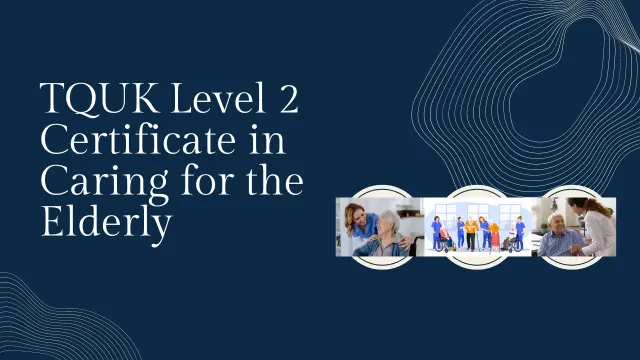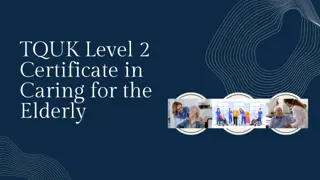
TQUK Level 2 Certificate in Caring for the Elderly
Online Learning College
Summary
Spread cost over 12 months.
- TQUK Level 2 Certificate in Caring for the Elderly - Free
- Tutor is available to students
- TOTUM card available but not included in price What's this?
Add to basket or enquire
Overview
The TQUK Level 2 Certificate in Caring for the Elderly is a comprehensive program that equips individuals with the necessary knowledge and skills to provide excellent care for the elderly. This course covers a wide range of topics, including Health and Wellbeing, Common Health Issues, Individual Rights, Minimising Risk and Communication. Participants will also learn about common age-related conditions and how to effectively communicate with older adults.
Qualification
Level 2 Certificate in Caring for the Elderly (RQF)
Description
About this course
This qualification covers topics such as person-centered care, promoting independence, communication, and understanding common health conditions in the elderly. It is suitable for those who are currently working in the care sector or aspiring to pursue a career in elderly care. Upon successful completion, learners will receive a recognised certification, enhancing their employment prospects in the care industry.
Assessments
To pass this course learners must pass 6 written assignments. These are completed after navigating through the corresponding lessons and writing your answers to assignment questions. Once these have been read and marked by your personal tutor, feedback and marks are provided to students which contain helpful tips to improve work in future assignments.
The TQUK Level 2 Certificate in Caring for the Elderly course assesses the following units:
Unit 1: Principles of Elderly Care in the UK
During this first unit, we will explore the fundamentals of elderly care, including the context of elderly care in the UK. We will discuss who is classed as an “elderly person” and what is meant by “the ageing population”. We will then explore the broad effects of the ageing population on society, the NHS, the economy and social care.
Unit 2: Maintaining Health and Wellbeing in Elderly Care
In Unit 2, we will explore how to maintain the dignity, wellbeing and health of those who require elderly care. Maintaining an older adult’s individuality and independence is vital to ensuring high-quality care. We will start by looking at these key terms, why they are important, and what it means to promote and maintain a person’s independence and individuality in social care.
Unit 3: Common Health Issues Affecting Individuals in Elderly Care
In this unit, we will cover the common illnesses that affect those in elderly care. We will first explore some of the common health concerns that may present themselves when caring for the elderly. The unit will describe what carers may observe if an individual’s health is worsening. It will then cover what to do when these health concerns begin to present or worsen.
Unit 4: Individual Rights in Elderly Care
In this unit, we will explore the rights of those in elderly care. The unit will begin by defining what safeguarding is and what its goals are. We will explore the principles that underpin safeguarding practice and why safeguarding is essential. We will discuss the correct terminology when discussing those at risk of harm and what factors make an individual at risk. We will then define and describe the ten different types of abuse. The unit will provide the signs that may identify each type of abuse and why abuse is sometimes not recognised or disclosed.
Unit 5: Minimising Risk in Elderly Care
This unit will cover assessing and minimising risk in elderly care services. First, we will outline why it is important to assess risk and when risk assessment is required in elderly care. The unit will then explore how to carry out an appropriate risk assessment in social care settings.
Unit 6: Communication in the Elderly
In this final unit, we will explore the use of communication in elderly care. The unit will discuss the different forms of communication used in elderly care. It will also outline how this communication coordinates services and enables multidisciplinary teams to work with continuity.
Who is this course for?
It is suitable for those who are currently working in the care sector or aspiring to pursue a career in elderly care.
Requirements
None specific.
Career path
- Nursing home
- Day care unit
- Residential social care
- Assisted living
- Hospice
Questions and answers
Certificates
TQUK Level 2 Certificate in Caring for the Elderly
Hard copy certificate - Included
Reviews
Currently there are no reviews for this course. Be the first to leave a review.
Legal information
This course is advertised on reed.co.uk by the Course Provider, whose terms and conditions apply. Purchases are made directly from the Course Provider, and as such, content and materials are supplied by the Course Provider directly. Reed is acting as agent and not reseller in relation to this course. Reed's only responsibility is to facilitate your payment for the course. It is your responsibility to review and agree to the Course Provider's terms and conditions and satisfy yourself as to the suitability of the course you intend to purchase. Reed will not have any responsibility for the content of the course and/or associated materials.



